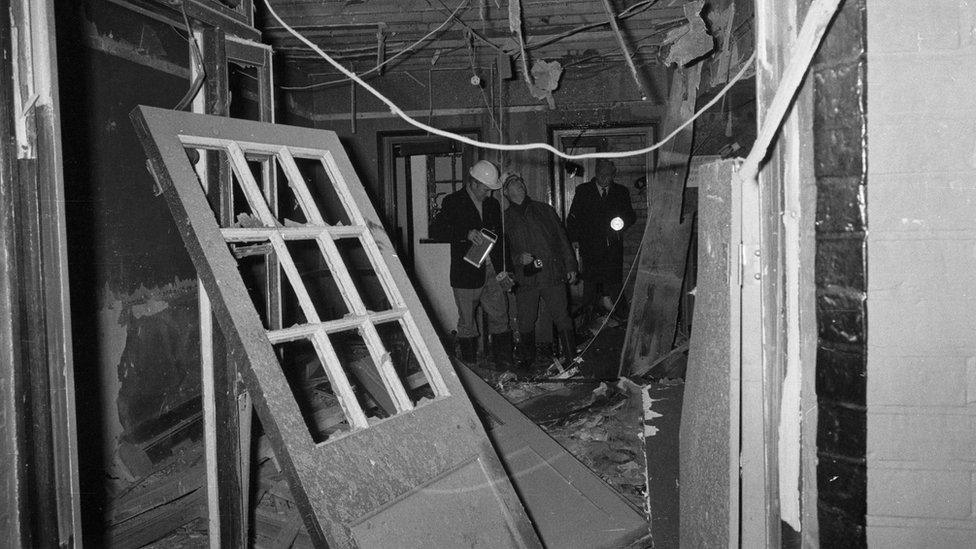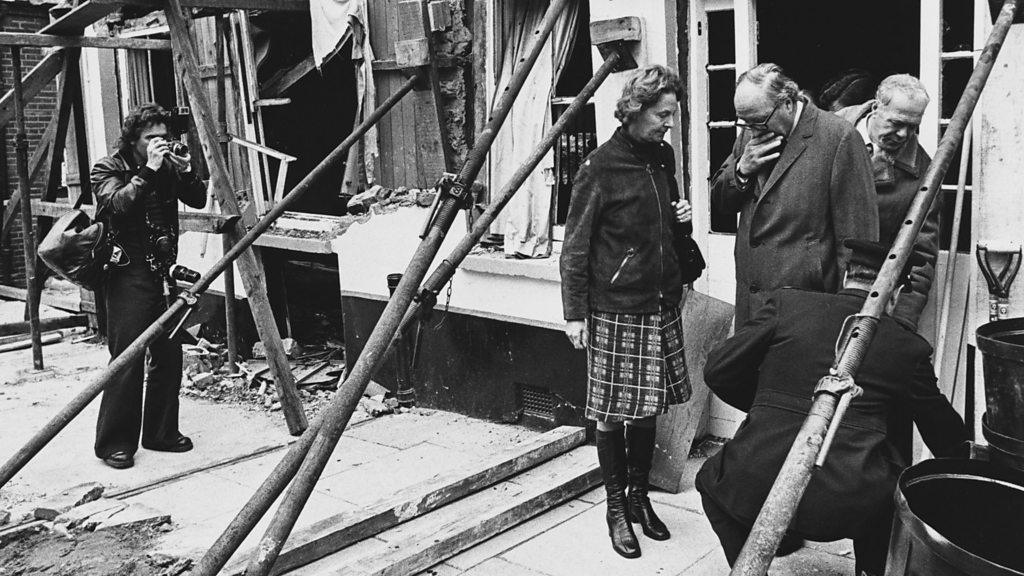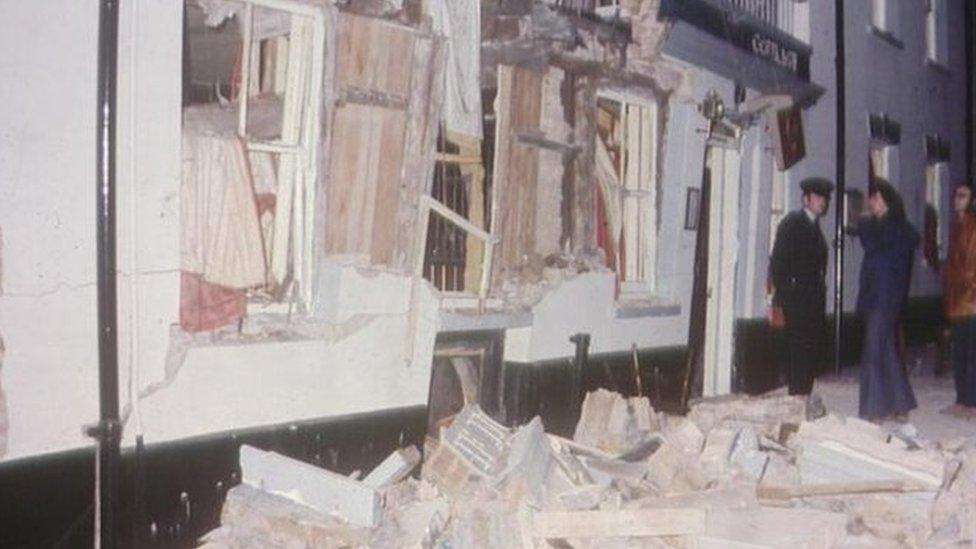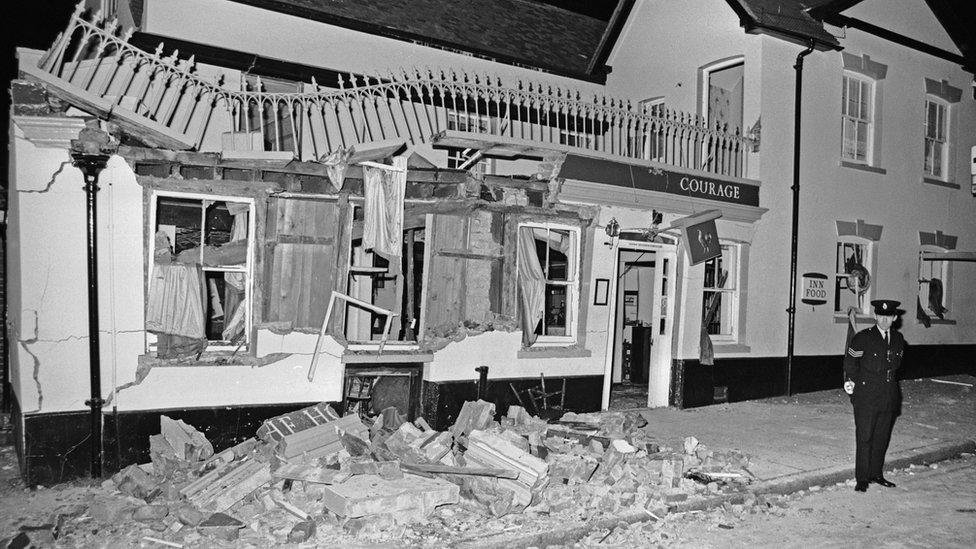Guildford pub bomb police took action to keep files closed
- Published

The bombs killed five people, injured 65 and saw 11 wrongly convicted
The police force investigating the Guildford pub bombs has been accused of a conflict of interest after it took legal action to keep archives closed.
More than 700 files on the 1974 IRA bombs had been due to open this year but were retained by the Home Office.
Inquest papers have shown Surrey Police applied for the files to stay closed.
A retired lawyer said police, who are compiling archives for the inquest, had a conflict of interest. Police said it was an independent government decision.
Two bombs went off in Guildford on 5 October 1974, killing five people and injuring 65.
Eleven people - the Guildford Four and Maguire Seven - were wrongly-convicted. Files from an inquiry by retired judge Sir John May have remained closed for decades.
In December 2019, the Home Office retained the files because of "any impact... on future inquest proceedings and investigations".
Papers showed Surrey Police "submitted an application for the material to remain closed" which was also on behalf of the Met Police and Avon and Somerset Police, which had files in the archive.
Alastair Logan, who represented the Guildford Four, said Surrey Police's action was not publicly known, adding: "It supports the contention KRW Law put down that there is a conflict of interest in whether they are dealing with it from a Surrey Police point of view and not from the point of view of the inquest."
KRW Law is representing the family of Ann Hamilton, who was killed in the attacks.
A Surrey Police report said the closure was "not for an indefinite period and will last for three years", adding the National Archives had requested an update next July.
However, Mr Logan said he was informed of closures from 75 to 100 years, adding: "The three-year closure is something which has never been mentioned before and... needs to be explained."

Four soldiers and a civilian died in the first explosion at the Horse and Groom
A Surrey Police spokeswoman said the Home Office contacted the force regarding a review.
She said: "Surrey Police sought the appropriate legal advice, which was submitted to the Home Office, which made an independent decision that the archive material should remain closed.
"The coroner has been fully sighted throughout this ongoing process."

Pub bomb archives
Inquest papers said bomb squad chief Bob Huntley, seen here behind Roy Jenkins, was at the scene
Inquest papers to be uploaded to a public website have been seen by the BBC. They contained updates on work carried out on archives to date, including:
Guildford Four member Gerry Conlon's sealed post-conviction interviews have been copied and given to Surrey Police
The Met has looked at how bomb squad commander Bob Huntley attended the scene
Work is under way to look for forensic scientists Douglas Higgs and Donald Lidstone
The Forensic Explosive Laboratory, formally Rarde, has said it holds papers but no physical exhibits from the original investigation.

Of 700-odd files, two were thought to be relevant to the hearing by junior counsel to the inquest Matthew Flinn.
They included a schedule of IRA incidents in London and "witnesses commenting on whether links could be drawn" between bombing incidents.
In his provisional scope, coroner Richard Travers said he did not agree the inquest should look at the wider IRA campaign. He also refused an active role to Guildford Four member Paddy Armstrong.
Mr Logan said: "If they are looking at links [between bombs], this is against the coroner's scope - and therefore there are relevant interests for those who were denied interested person's status."

The wrongly convicted Guildford Four served 15 years in jail
At a pre-inquest review on Wednesday, Fiona Barton QC, representing Surrey Police, told the coroner: "The reality of the National Archives material is it's closed to members of the public. It's not closed to members of your team."
She told Mr Travers: "Your team has unrestricted access and the implication that there is something sinister about the fact that material remains closed is terribly misleading. It undermines the transparency of this inquest."
Mr Travers replied that his team had access to every document that exists and he said whether papers were relevant "ultimately will be up to me to decide".
He said: "There is no closed material. We have access to everything. This is an open inquest and it must be seen as such."
Counsel to the inquest Oliver Sanders QC said it was now known that were around 300 statements from about 200 witnesses, many of whom were still alive, that were potentially relevant material.
He said many of those statements gave similar accounts - that "there was a hissing noise and there was an explosion and then things went black and there was chaos".
A further pre-inquest review is to be held on 29 March.
Related topics
- Published2 December 2020

- Published2 September 2020

- Published26 February 2020

- Published31 December 2019
